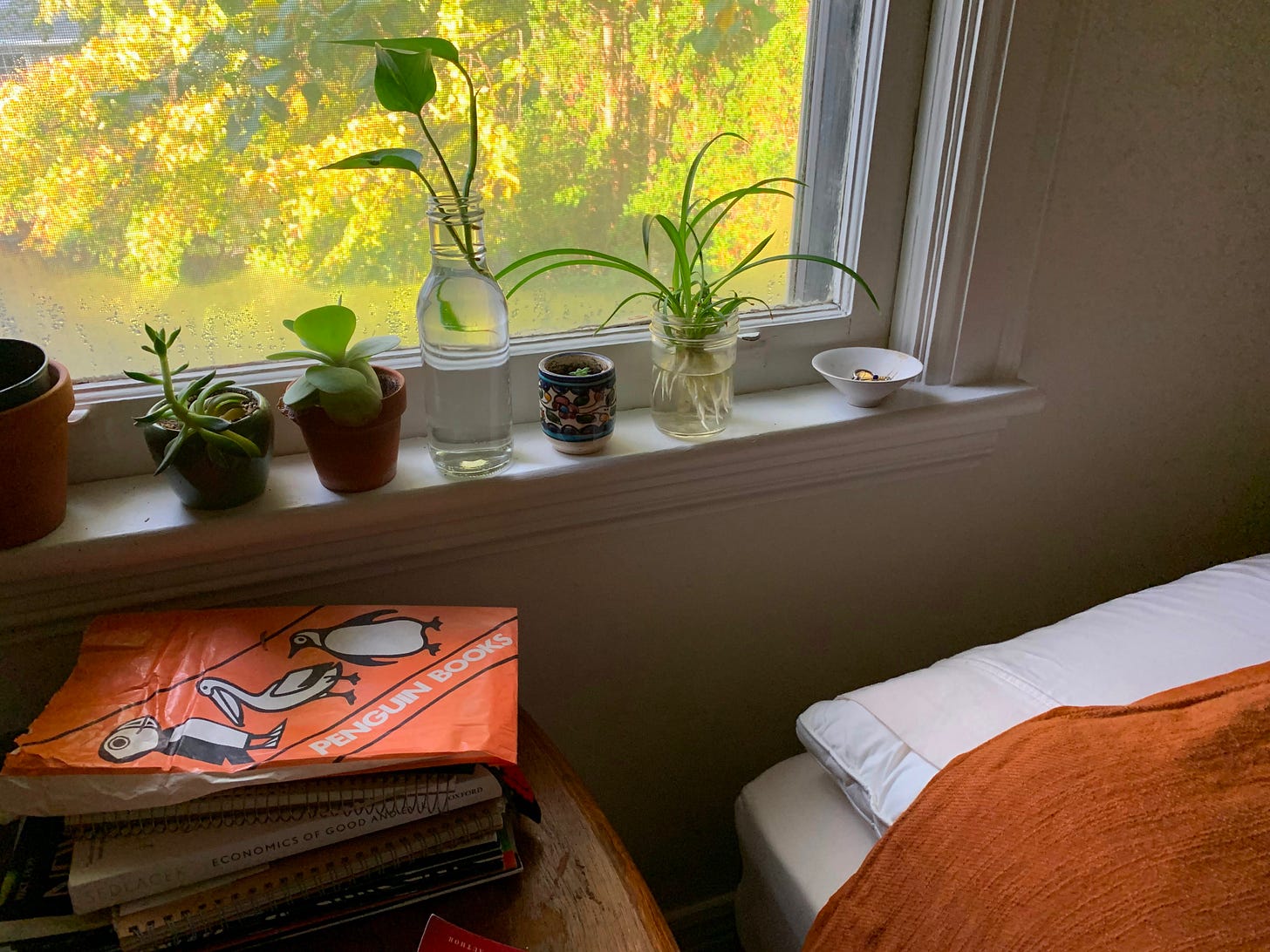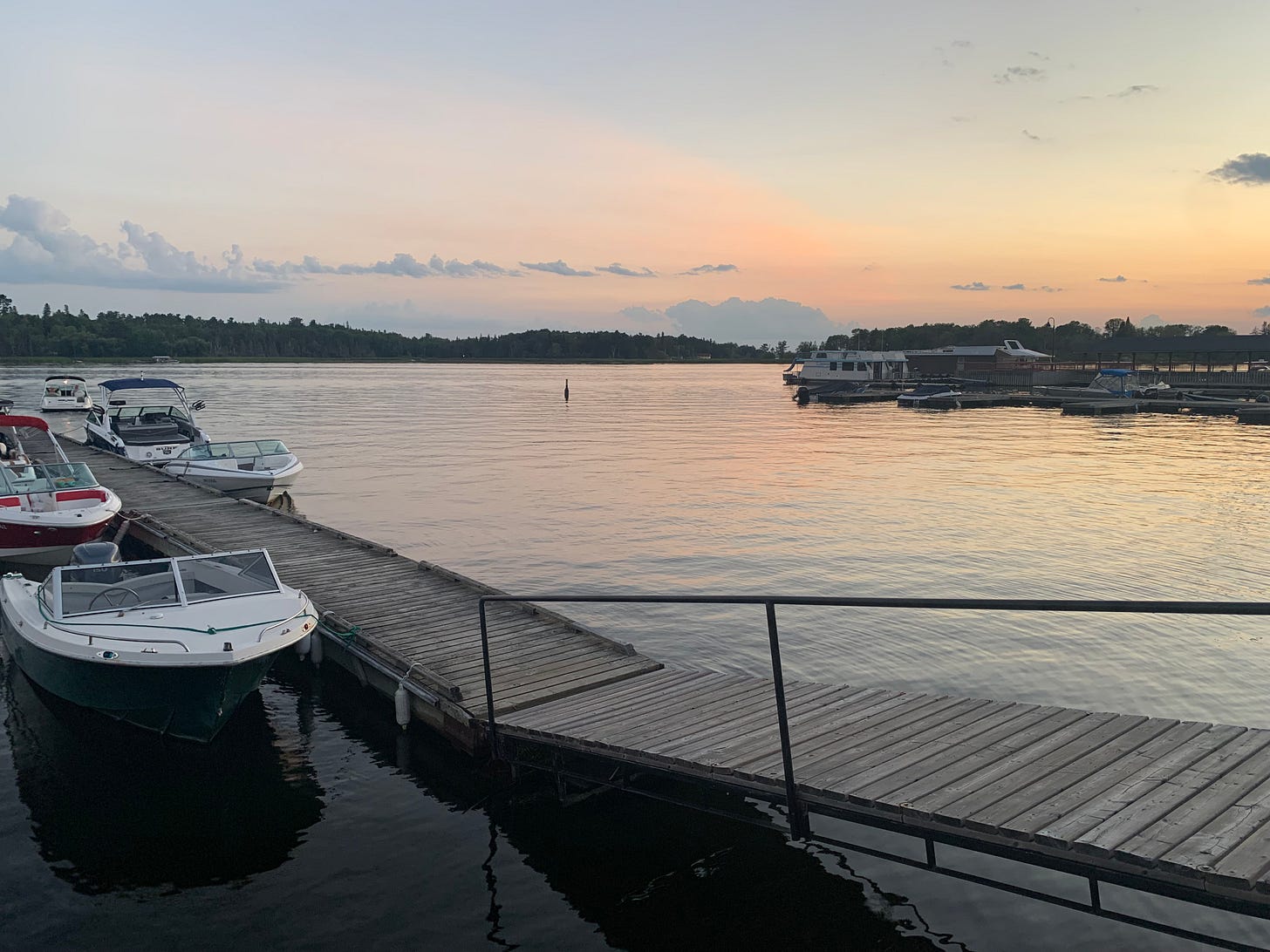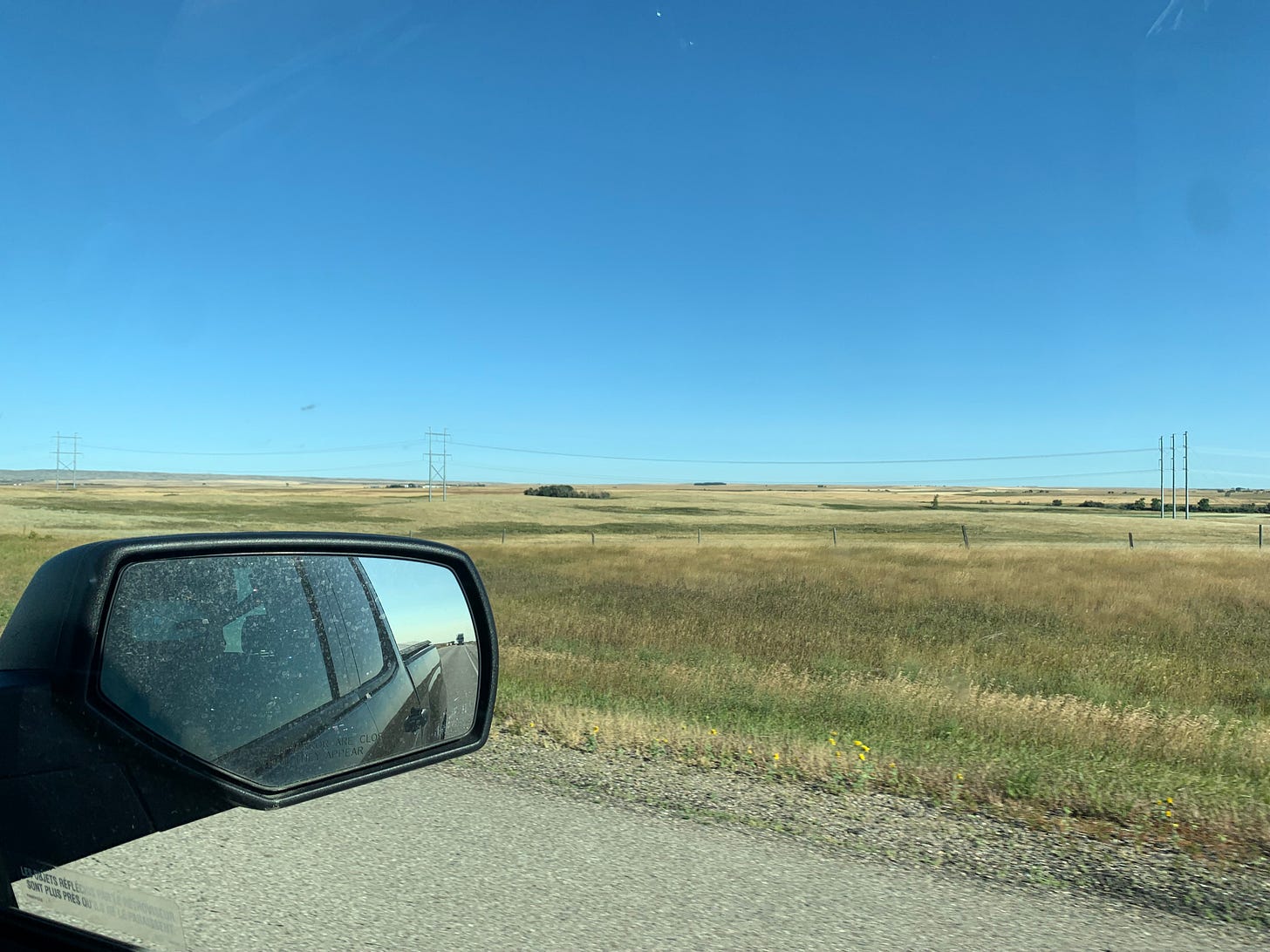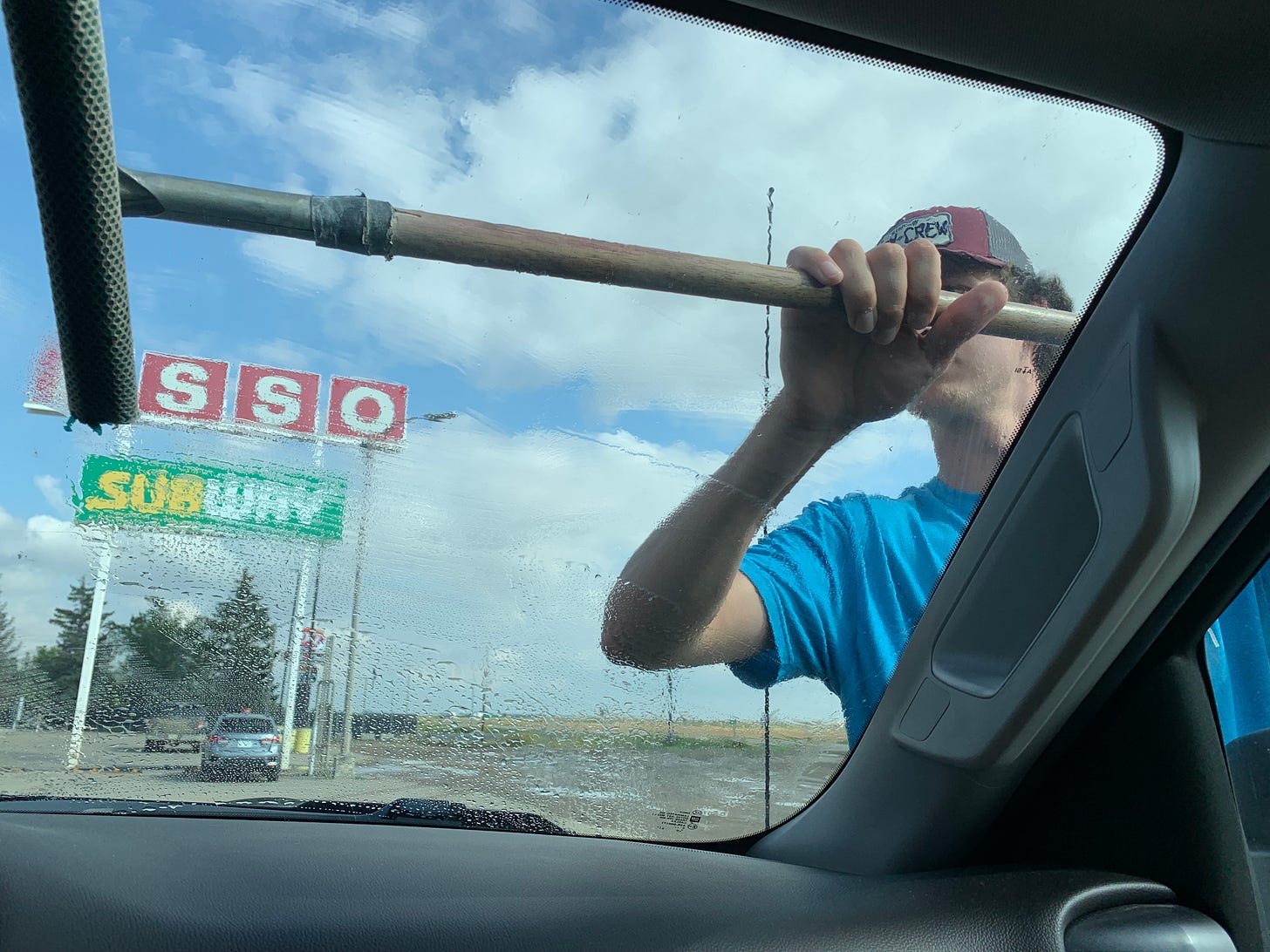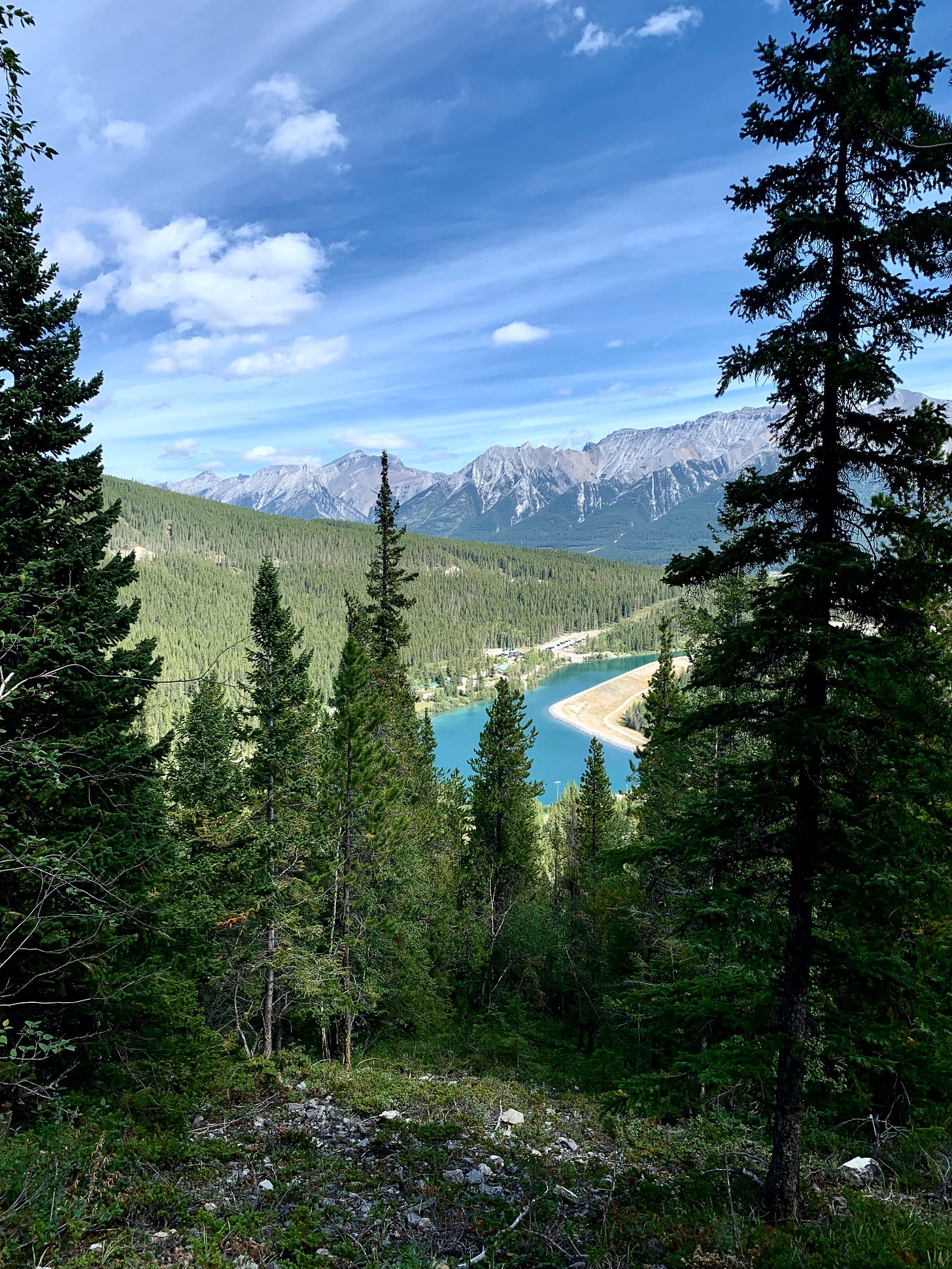I wrote most of this after the drive, but I’m using the present tense because it feels right
Day 0
I’d almost forgotten that this mad plan to drive across the country with my entire family—to get my brother to his new job in Calgary, to get me to my new degree in Vancouver, and to get my parents out of the house—was, after all, my idea. Suddenly it’s happening, for better or for worse.
I’m jittery, covered in minor wounds (bike accident), and so full of love. I split my time between packing and saying goodbye to my friends and to the city, and I soak in the glorious realization that my undergrad family will be mine for life. Time is speeding up, and it’s slowing down. I’m not excited, exactly, but I’m energized, which is the second best thing.
I imagine what it’ll be like to know I drove thousands of kilometers to open this new chapter of my life. Plus, it’s my third road trip of the summer, and that’s a lot of driving. What would the summer look like if I tried to measure it with numbers?
6,700-ish kilometers of road trip, very approximately
Seven books and three half-books read
Seven new playlists, three abandoned
15-20 times peeing in the woods
60,000 emails deleted (I swear this was better than sex)
I think I went through three jars of peanut butter in three months, which is a shocking 15,000 calories of peanut butter1
One bad sunburn
One new friend
Many old friends
Sometimes I wish I could see my life in statistics: how many times I’ve cried, how many feet of hair I’ve cut off, how many miles of sentences I’ve written, how many sneezes, steps, stitches, slices of bread. Maybe it’s better not to know.
When I’ve finished packing, my room looks almost the same as it did before I started. I brought half my life to Hamilton when I moved there three years ago, and I moved home bringing what felt like a whole life back with me. My childhood bedroom isn’t big enough to contain both, and the closet is stuffed to bursting. This time, I’m flying distance instead of driving distance from my new city, so I can’t bring much with me and I can’t bring much back. I wonder if my life in Vancouver will feel more separate, more removed, because there’ll be less continuity in terms of the stuff filling my space.
My Toronto bedroom is all cool colours, greys and blues. My room in Hamilton was fiercely warm, honey and dark orange and light green and creamy white. I can’t overstate the significance of this. The last thing I do before closing my suitcase is take from my bed the denim blue duvet cover—the one I chose in high school—and replace it with the rust-coloured one I picked for my student house. It looks strange here and I stare at it for a minute, happy-sad. I’m taking the blue to Vancouver because it’ll go better with the quilt my mom made for me. It will live in my new room alongside other remnants of each past life, including all the postcards I collected during undergrad and stuck on my Hamilton walls. Maybe objects take on new meanings in new contexts. Here’s to finding out.
Day 1
I’m running on adrenaline instead of sleep, which always works well until it doesn’t.
What I want most from this drive is to reconnect with my brother, who I’ve barely seen all year. He’s always beautiful when he comes home from camp, his tanned skin seeming even darker against the white of the curly, sunbleached hair, his arms and knees covered in the small scars of a summer spent outdoors. This year, he’s grown a little beard. Time and distance can turn my twin into a stranger, and I’m eager now to learn what’s been happening inside his head and to tell him what’s been happening inside mine.
At the beginning of the summer, Alexander bought a used Chevy Silverado—when I asked, I got responses such as “trucks are cool” and “I wanted a big car”—and he and I are driving the truck to Calgary while my parents take our family’s Tiguan. Driving a truck isn’t as different from driving a car as I expected. It no fun to park, but on the other hand it doesn’t really matter if you hit the curb. I learn how to use cruise control, which I don’t think I like. Probably the most important thing is that I feel pretty damn cool when I climb into the bed to load our stuff. I sort of see the appeal.
I’m riding the high of a brilliant last weekend together with my Arkell housemates, and then two days spent catching up with other friends, which means I’ve been doing a lot of talking. Sometimes I need to be reminded that hours of discourse is not everyone’s idea of a good time, and not everyone likes to talk about their feelings. Ignoring these facts, I spend most of the first day coaxing Alexander into conversation. I try to get him to open up about how he feels leaving his friends behind, moving across the country, and starting a new job, and I find out that he doesn’t really feel much about it. So we move on.
We talk about our brains changing as we get older, about friendship, the ills of social media and video games, the concept of progress, nuclear proliferation, Gandhi, and what girls what. I try to explain Taoism to him, and he tries to explain to me how engines work. He talks about his skeptical post-Catholic school relationship with religion, and I do my best to explain my ill-defined beliefs about collective consciousness. I try to articulate to him this idea I’ve had that both knowledge and history follow a model of planetary orbit, with layers of linear and cyclical movement. He humours me. It’s a two way street, even if the traffic is heavier in one direction, and we’re both in decent spirits.
The drive north and west through Ontario is more spectacular than I could have imagined. The rocks are impossibly red, the water impossibly blue. We end up at a campground near Agawa Bay where a group of drunk middle-aged women in pink shirts are playing cornhole, and I get my parents to do stretches.
Day 2
The second day is the longest. We spend 12 and a half hours on the road, part of it stuck in horrible traffic.
I realize that my mood depends directly on whether I’m the one with the aux, which seems bad, and then eventually I get sick of music altogether. I also get sick of trying to work. (I’ve been slogging through the last task from my RAship with my laptop balanced on my crossed legs, taking breaks as the service cuts in and out.) I get sick of my own company. Ale and I don’t talk much. Is it possible we ran out of things to say to each other on day one? I look at him and wonder what he’s thinking, and then I realize I’m not thinking anything and it’s very possible he isn’t either. Maybe it’s good to rediscover the capacity to do nothing.
“My muscles are turning into jelly and my joints are turning into wood,” I complain. He informs me that actually, muscles take two weeks to atrophy, so I should be fine.
Ontario is massive. We’ve driven more than 22 hours, and somehow we’re still in the same province. Germany, where my dad comes from, could fit inside Ontario three times. If we’d started there, we could be in the middle of Spain by now.
We stop at last at a motel outside Kenora, and the TV, which keeps turning on of its own accord, bathes the room in a sickening purple glow. At least there’s a nice sunset when we drive into town looking for dinner.
Day 3
I now understand the importance of cruise control.
The prairies are unbelievably flat, and often the highway is a perfectly straight line, because the land has no contours around which the road needs to bend. This creates the impression of a geography that’s almost two-dimensional, and it freaks me out. The gas stations and lonely roadside diners seem especially desolate in this flatness.
As we move further west, wheat fields start to dominate the landscape, and the world turns from green to yellow. We agree that it feels like we’re trapped inside the wheat tile from Settlers of Catan. I sit there, just holding the wheel but hardly needing to, my gaze fixed on the endless horizon.
Today we listen to history podcasts: the French Revolution while Alexander drives and the Soviet Union while I drive. This is good middle ground for us.
We stop in Moose Jaw, Saskatchewan, which is one of the nicer small cities I’ve seen. The public park near its centre is like an oasis to a traveller emerging from the desert. A flag proclaims that we’ve entered “Canada’s most notorious city: NOTORIOUSLY INDUSTRIOUS.” As far as I can tell, the main industry here is retirement homes, but maybe industriousness is a vibe. Who am I to say?
I keep thinking I see my name on every sign we pass.
Day 4
In the breakfast room at the Pilgrim Inn in Canport, we chat with a man who tells us he works at a paper mill further north than he can show us on the map. I catch myself fixating on his hands as he speaks, hands that look like a lifetime of hard work.
He marvels at me and Alexander when he finds out we’re twins, saying we look nothing alike. He laughs incredulously at how different our paths seem, too: grad school for political theory and mine engineering for an oil company. “I bet you two have… interesting conversations,” he says. He asks us if we communicate with a special twin language, like his little nephews seem to do, and Ale answers “no” without hesitation.
Back in the truck Alexander and I have an interesting conversation: that is, we talk about politics. I struggle to swallow the fact that my brother and I have different values, and his values scare me a little.
I realize this rural aesthetic he’s been leaning into—with the truck, the country music, the baseball hats and flannels, and the twang he’s started to cultivate in his voice—reflects a serious libertarian streak. What he seems to believe most deeply is that he should be allowed to do what he wants and never forced to do anything he doesn’t. Justice means being duly rewarded for hard work, and the public good is just the accumulation (but not redistribution) of the benefits of society’s productivity. He thinks most people are stupid, and so decision-making should be left to the elites. He has no interest in voting. He’s apathetic, and he thinks the system works just fine. He says, again and again, “it is what it is” and “it’s not that deep.”
When the blue outline of the Rockies finally rises in the distance, we drink it in like it’s the water of life. The fields turn slowly from yellow to green again, and we see fewer cattle ranches and more horse ranches. Calgary sprawls around us, and then we’re past it and in the foothills of the mountains. We reach Canmore, a skiing and hiking town with an eerily contrived and vaguely Nordic atmosphere, and I can’t believe it’s over.
Days 5 + 6
These two days in the Rockies are our reward for four days of nothing but driving. I feel like a zombie as I drag myself out in the morning, but it’s so good to finally stretch my legs. We go south into Kananaksis, past the Three Sisters.
First we hike to Grassi Lakes, where the water is jewel-toned. We go further, and a pipeline cleaves the forest in two, scarring the landscape. We have to duck under its huge white belly to follow the trail.
The tension builds inside me as we ascend, and when we reach our highest elevation I start to cry. The weight of all the possible directions I could have taken is hard to shoulder. I think, am I having an existential crisis? the way I imagine people with chest pain wonder whether they’re having a heart attack. On the way down, the tension dissipates, and I’m happy again by the time we reach the parking lot.
Canmore is a cradle, surrounded by mountains on all sides. I feel held. At dinner I have the best naan of my life.
The next day it rains, but we head to Spray Lakes anyway, and on the road there are mountain goats. Now that the pressure of the long drive has eased a little, I feel guilty for the way I’ve been acting around my family, and especially around Ale. When I look at myself through his eyes, I’m high-strung, irritable, condescending, judgemental. God, I’m my dad. I’ve been telling myself that my brother resenting me for a while is a reasonable price to pay for reminding him to care about other people and for planting the seed of questioning in his head. But what if he isn’t hearing me, or if I’m just making him dig his heels in further? What if it’s not my place to call him out or to try to steer him in what I think is the right direction?
Alexander stays home because he feels sick, so on the way to the hike, I ask my parents what they think. They try to put things in perspective, which is both aggravating and helpful. I remember that it isn’t productive for me to overreact or to overstep, and I feel calmer. But I’m itching to be on my own again, to get away from this insufferable version of myself that being with my family sometimes brings out.
The trees are spindly giants rising from a carpet of bright green moss, raising their ragged arms to the sky. It is freezing.
Day 7
It’s below five degrees this morning and raining again (it’s supposed to be August?), and the mountains are covered in snow. I don’t even own a rain jacket, but I guess this is my life now. Luckily the plan to wear my heavy clothes to the airport instead of packing them—boots, jeans, denim jacket, the sweater my dad wore on his first dinner date with my mom—now seems perfect.
The night before we left Toronto, Alexander offloaded a bunch of hand-me-downs onto me, partially because he knows I love inheriting his clothes and partially because he doesn’t want to deal with them himself. I refused an awful grey shirt with a paddleboard graphic on the front and the sleeves cut off, but he insisted I take it, smirking and dancing away as I tried to chuck it back at him. “Don’t look a gift horse in the mouth,” he laughed.
Last night as I was re-packing my suitcase for my flight from Calgary to Vancouver, I found that shirt rolled up at the bottom with a note that said “Gift horse!” tucked inside. I snuck the shirt back into Ale’s suitcase, but this morning he pulled it out and tossed it back to me, grinning. He’ll find it in the Chevy’s glove compartment later. I left him my sunglasses, too, because he looks cooler in them than I do.
By the time we arrive at the Calgary airport, we’ve driven 3,734 kilometers and spent more than 40 hours on the road. I sit in YYC, waiting for my flight and watching the rain roll down the glass, exhausted but mostly, probably, ready.
If the internet is right about how many calories I need per day for my height, weight, and activity level, then roughly 7% of my caloric intake this summer was peanut butter




